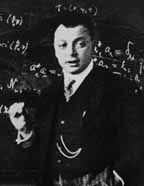 |
|
'Desperate Remedy' Hits the Big Seven-0 by Mike Perricone
He did exactly that, in his famous letter dated December 4, 1930, and addressed to "Dear Radioactive Ladies and Gentlemen." Unable to attend a conference in Tubingen, Germany, Pauli sent the letter to his colleagues outlining what he called "a desperate remedy" to the perplexing phenomenon in beta decays that produced electrons with a range of energies instead of a single energy every time.
Pauli proposed electrically neutral particles (he called them "neutrons") in the nucleus, with spin of 1/2 and mass on the order of magnitude of the electron mass, and which do not travel with the velocity of light. The first public hearing of Pauli's particle proposal came six months later at a meeting of the American Physical Society in Pasadena, California. Enrico Fermi eventually renamed the particle the neutrino.
About 25 years later, T.D. Lee and Frank Yang of Princeton said there might be some funny business in the symmetry of beta decay. Soon thereafter, Chien-Shung Wu and colleagues at Columbia University found beta decay electrons all coming to one side instead of spraying out uniformlyůthe result, it appeared, of neutrinos existing only as left-handers, with their right-handed version being the antineutrino.
"Happy Birthday, Lefty?" Not so fast.
"Speaking as a left-hander, I like the idea of celebrating that aspect of neutrinos," said MINOS collaborator Peter Lucas of Fermilab. "However, if they have even a small mass, they also must have a small right-handed component."
"As far as we know, left-handed neutrinos and right-handed antineutrinos both have `normal' weak interactions," said Bill Louis, co-spokesperson for MiniBooNE. "There could exist right-handed neutrinos that are Žsterile' and left-handed antineutrinos that are Žsterile.'"
Either way, Pauli probably wouldn't serve as the life of the party for any Big Seven-0 celebration. According to The Search for Infinity (Gordon Fraser, Egil Lillestol, Inge Sellevag; Facts on File; $23.95), renowned physicist Victor Weisskopf recalls finding a mistake in one of his own published calculations, and asking Pauli, his teacher, whether he should give up physics.
"Don't," Pauli responded. "Everyone makes mistakes. Except me." |
| last modified 12/1/2000 email Fermilab |
FRLsDFx9eyfrPXgV
 By all accounts, Wolfgang Pauli was the kind of physicist who could claim with equanimity that he would save the law of conservation of energy.
By all accounts, Wolfgang Pauli was the kind of physicist who could claim with equanimity that he would save the law of conservation of energy.